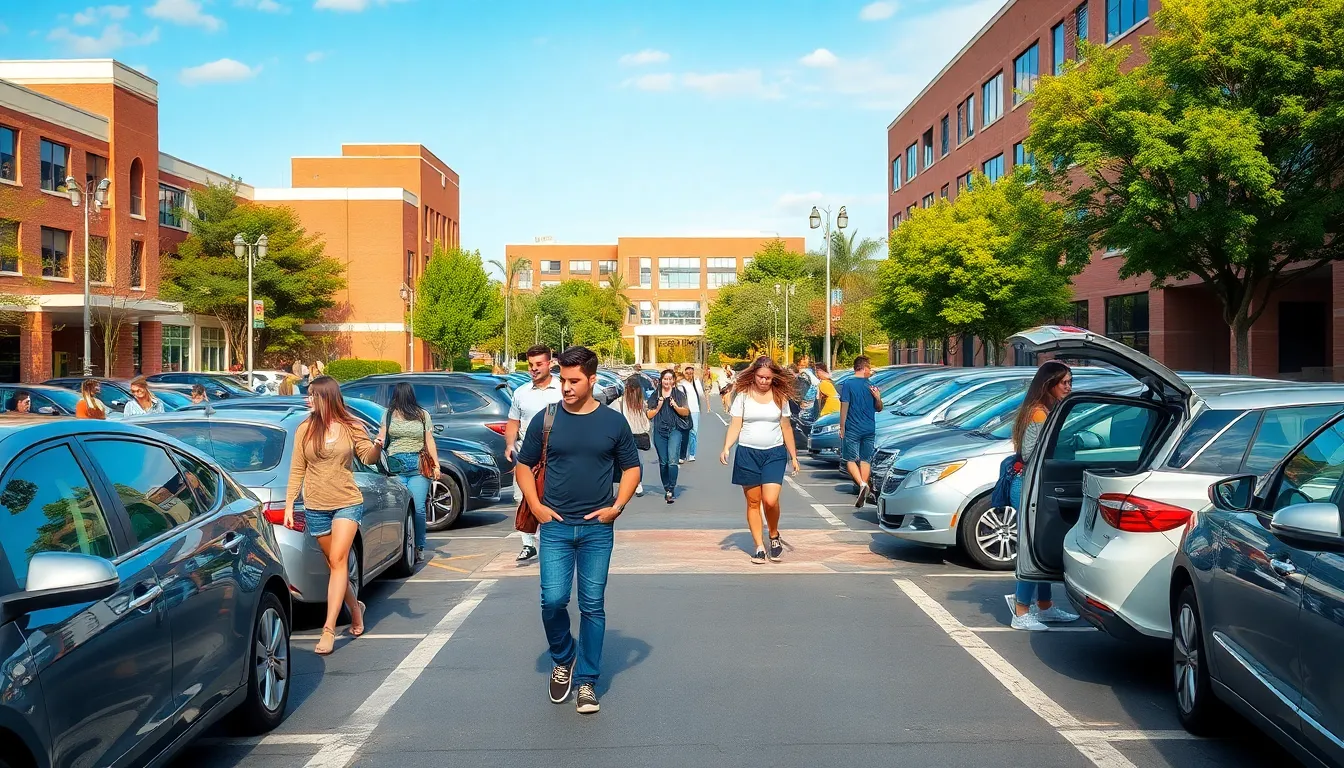Table of Contents
ToggleNavigating college life is tough enough without the added challenge of finding a parking spot. Picture this: you’re late for class, your coffee’s spilling, and the only available space is a mile away. College parking can feel like a game of musical chairs where the music just won’t stop.
Overview of College Parking
Parking on college campuses presents significant challenges for students and faculty alike. Many institutions deal with limited space, creating competition for available spots. Large commuter populations increase the pressure, especially during peak hours when classes begin or end.
Campus parking policies often contribute to the frustration. Permit requirements vary by institution, and fees can add an additional burden. Many students feel overwhelmed by strict regulations and time limits imposed on parking zones.
Some colleges implement designated areas to help streamline parking, such as commuter lots versus resident lots. These distinctions aim to improve access for all users and reduce congestion. However, enforcement remains inconsistent, leading to further confusion among drivers.
Alternative transportation methods provide solutions to parking woes. Universities frequently encourage biking, walking, or using public transit. Shuttle services often link key areas on campus, offering convenient options for those who prefer not to drive.
Technology plays a role in modernizing campus parking. Mobile apps allow for real-time tracking of available spots, reducing the time spent searching. Some campuses even provide digital permits, making the process more efficient for students.
Demand for parking during events poses an additional challenge. Football games or concerts attract large crowds, necessitating strategic planning from campus management. Many venues utilize overflow parking lots, sometimes requiring shuttle services to transport attendees.
Importance of College Parking

College parking plays a crucial role in student experiences on campus. Adequate parking influences daily routines and overall satisfaction.
Impact on Student Life
Accessible parking significantly affects students’ academic performance and social life. Difficulty in finding parking leads to stress, often resulting in tardiness and missed opportunities for engagement. Students may feel anxious while searching for spaces, detracting from their ability to concentrate on studies. A lack of parking options encourages frustration, which in turn may decrease participation in campus activities. When students struggle to secure parking, they may isolate themselves from social events and connections, impacting their college journey negatively.
Accessibility and Convenience
Convenient parking enhances accessibility for all students. When parking facilities are available close to academic buildings, commuting becomes hassle-free. Accessibility features, such as designated spots for students with disabilities, promote inclusivity on campus. In addition, facilities that allow easy entry and exit streamline the daily commute. Simplified parking processes reduce confusion regarding permits and fees. Students benefit from user-friendly apps for locating available spots in real-time, further mitigating the challenges associated with parking. Improved access makes college environments more welcoming and accommodating for everyone.
Types of College Parking
Various types of parking exist on college campuses, each serving distinct needs for students, staff, and visitors. Understanding these categories helps navigate campus parking more effectively.
Permit Parking
Permit parking is a common arrangement at many colleges. Students and staff must obtain a parking permit, which designates specific areas for parking vehicles. Fees vary by institution and might reflect the location and availability of spaces. Many campuses promote different permit types, such as residential, commuter, or faculty. Acquiring the appropriate permit ensures access to designated zones, reducing the stress and uncertainty surrounding parking. Unauthorized vehicles face fines and towing, underscoring the importance of adherence to permit regulations.
Metered Parking
Metered parking offers a flexible option for short-term stays on campus. Spaces equipped with meters allow hourly or daily payment for parking. This setup accommodates visitors and those who need quick access without a long-term commitment. Meters often accept multiple payment methods, including coins, cards, and mobile apps. Enforcement occurs regularly, encouraging compliance and decreasing violations. Effective management of metered parking helps balance demand and availability, especially during busy campus hours.
Visitor Parking
Visitor parking supports guests attending campus events or meetings. Dedicated spaces provide convenient access to various facilities while ensuring that visitors do not disrupt regular students’ and staff’s parking routines. Institutions often designate these areas close to main entrances for ease of access. Check-in procedures may vary; some colleges require visitors to register upon arrival. Campus signs and information resources help guide unfamiliar guests to available options, promoting a welcoming atmosphere for everyone on campus.
Challenges of College Parking
Parking challenges on college campuses significantly affect student experiences. Numerous factors contribute to this problem, with space limitations and cost considerations being two of the most pressing concerns.
Space Limitations
Space limitations create a tense atmosphere for students seeking parking. Colleges often struggle with a finite number of spots while accommodating increasing commuter populations. High enrollment numbers intensify competition during peak hours, making the search for a parking space feel overwhelming. Even with designated parking areas, confusion can arise when students are unsure of where to park. Alternative transportation options, such as biking or public transit, may not serve all students, further compounding the issue. This shortage of spaces can lead to frustration, tardiness, and missed academic opportunities.
Cost Considerations
Cost considerations add another layer of complexity to college parking. Fees associated with permits can vary widely, depending on the institution’s policies. For many students, the expense of parking permits contributes to their financial burden during college. Some institutions may implement higher rates for premium parking areas, making them less accessible to those on a budget. Metered parking presents a flexible option but can add up quickly for daily users. The importance of affordable parking options becomes increasingly clear, as students seek balance between financial limitations and the need for convenient access to campus facilities.
Solutions for Effective College Parking
Implementing effective solutions can alleviate college parking challenges. Improved infrastructure and technology integration play vital roles in enhancing campus parking experiences.
Improved Infrastructure
Upgrading parking facilities increases capacity and accessibility. Expanding existing lots or constructing new garages accommodates rising student populations. Clear signage aids navigation, reducing confusion around designated areas. Enhanced lighting promotes safety during evening hours, making parking more inviting. Surface improvements also contribute to a smoother parking experience. Colleges should prioritize maintaining parking areas to prevent deterioration. Creating designated spaces for specific needs, such as electric vehicles or ride-sharing, addresses diverse student requirements. Such infrastructural enhancements foster a more organized and user-friendly environment for everyone.
Technology Integration
Integrating technology streamlines the parking process considerably. Real-time tracking apps help students locate available spots quickly. Implementing digital permit systems simplifies purchasing and managing parking permits. Mobile payment options enhance convenience for metered parking and visitor spots. Developing notification systems informs students about peak parking times and alternative options. Furthermore, utilizing data analytics enables campus management to understand usage patterns, aiding in strategic planning for future infrastructure needs. These technological advancements create a more efficient parking experience, reducing frustration and enhancing campus life.
Navigating college parking is a significant aspect of student life that can greatly influence overall experiences. The stress of finding a spot can detract from academic focus and social engagement. As campuses evolve with growing populations and infrastructure needs, addressing parking challenges becomes essential.
Implementing innovative solutions like real-time tracking apps and improved facilities can enhance accessibility and convenience. By prioritizing effective parking strategies, colleges can foster a more inclusive environment that supports student success and well-being. A well-planned parking system not only reduces frustration but also enriches the college journey, allowing students to concentrate on what truly matters.




